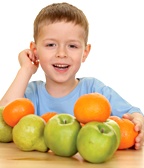Think Natural
By Editorial Staff
According to the Centers for Disease Control and Prevention, approximately 1.6 million elementary school-aged children have been diagnosed with attention-deficit/hyperactivity disorder. Many parents of hyperactive children have long suspected that artificial ingredients in foods worsen their children's behavior. Now there's evidence to back up those suspicions.
A recent study in The Lancet is the first to show a link between various common food dyes, such as "sunset yellow" and "allura red," and sodium benzoate (a preservative used in many soft drinks, fruit juices, salad dressings and other foods) and hyperactivity in some children.
 The research tracked 300 children in two age groups, 3-year-olds and 8- and 9-year-olds, who were put on a diet free from additives and given one drink per day containing either fruit juice or a mixture of benzoate preservative and food coloring. After two weeks, children in both age groups were significantly more hyperactive when drinking the beverages containing additives.
The research tracked 300 children in two age groups, 3-year-olds and 8- and 9-year-olds, who were put on a diet free from additives and given one drink per day containing either fruit juice or a mixture of benzoate preservative and food coloring. After two weeks, children in both age groups were significantly more hyperactive when drinking the beverages containing additives.
Researchers advise parents that hyperactivity has complex causes and cannot be cured by simply avoiding food colorings. But by limiting preservatives and artificial flavorings in your child's diet and replacing them with natural, whole foods, you can be sure you're giving your child a sound foundation for health and wellness.

